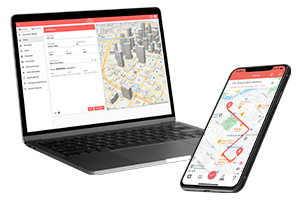Last updated: April 23, 2024
Understanding and managing gas mileage costs effectively is essential for anyone who drives for business purposes. The IRS provides specific gas mileage rates intended to simplify your tax deductions related to vehicle operation costs. In this comprehensive guide, we explore the IRS gas mileage rates and reimbursement policies for different employment statuses, and compare the benefits of various deduction methods. Additionally, we delve into practical tools like MileageWise that can simplify tracking your mileage and gas expenses, making your road trips worry-free and financially manageable.

Understanding IRS Gas Mileage Rates
To begin with, understanding the IRS gas mileage rates is crucial for anyone looking to claim deductions or manage travel expenses effectively. The IRS sets a standard rate per mile, adjusted annually, which reflects an average cost of operating a vehicle—including gas, maintenance, and depreciation.
Moreover, the rules of claiming deductions for both mileage and gas are governed by specific IRS rules. These regulations stipulate that you cannot claim both deductions simultaneously; instead, you must choose between deducting your actual gas expenses or the standard mileage rate. This decision largely depends on which method proves most beneficial for reducing your taxable income.
Mileage Reimbursement Policies for Employed and Self-Employed
For both employed and self-employed individuals, understanding mileage and gas allowances is crucial. Employers might offer a gas allowance per diem or reimbursement at the IRS rate, impacting how employees claim deductions. Self-employed professionals, however, must navigate these waters alone, often relying on meticulous tracking to maximize their deductions for gas and mileage.
The legal and tax implications of these policies also vary. Employers must adhere to federal and state guidelines when offering gas allowances, whereas self-employed individuals must ensure their claims are supported by solid documentation to withstand IRS scrutiny.
Comparison of Deductions: Gas vs. Mileage
Deciding whether to deduct gas expenses or mileage comes down to a straightforward comparison of financial benefits. Writing off actual gas expenses requires meticulous record-keeping of receipts and could vary widely based on fluctuating gas prices. On the other hand, using the national standard mileage rate simplifies record-keeping by requiring only a log of miles driven, providing a more predictable and often more generous deduction.
The case where your car expenses per mile surpass the IRS average might mean that the actual expense method is more advantageous. For instance, a professional who frequently travels long distances might benefit more from this method due to higher overall vehicle operation costs and a high count of miles. Conversely, someone who drives a fuel-efficient car over shorter distances may find it more advantageous to deduct the standard mileage.
Calculating Cost of Gas for Business Trips
Calculating the average cost of gas per mile for business purposes involves more than just noting the price per gallon; it requires a comprehensive approach that considers vehicle efficiency, travel frequency, and the nature of the business trip. Gas and movement tracking tools are available through websites and apps that can help determine the most cost-effective strategies, ensuring that businesses and self-employed professionals alike can maintain their budgets effectively.
How to Track Gas Mileage and Expenses
Tracking gas mileage and expenses can be seamlessly managed through the use of dedicated apps like MileageWise. These apps not only track your trips via GPS but also provide tools to categorize trips as personal or business, integrate expense receipts, and generate compliant reports for tax purposes. The advantage of using such technology is the elimination of guesswork and the provision of accurate, IRS-compliant logs that can be invaluable during tax season.
MileageWise: Your Personal Gas Mileage Tracker
MileageWise is like having a reliable secretary in your pocket, tracking your gas mileage and producing organized, tax-friendly reports. Ideal for road-tripping freelancers, hardworking small business owners, and resourceful employees. It’s your digital fuel consumption tracker, your vehicle fuel tracker, and your gas mileage logbook all combined into the best app for tracking business expenses and mileage.
Now, before we dive into the details, let’s address the elephant in the room – yes, the gas mileage tracker is a feature included in the MileageWise app! MileageWise steps in to eliminate the hassle of tracking gas mileage for tax purposes. With this resource at your fingertips, the days of manual logging and misplaced fuel receipts are a thing of the past.
Download MileageWise’s automatic mileage tracker app from Google Play or the App Store & try it for free for 14 days. No credit card required!

Refueling Has Never Been Easier
The highlight of this impressive piece of software is its ability to track your refueling within the app. MileageWise’s refueling feature is simple to use and crucial for efficient tracking.
You’re probably thinking, “Alright, that sounds useful, but how does it work?” Don’t worry, we’ve got you covered. Let’s walk through how to add refueling to your MileageWise app.
- Recording a New Filling Station: Make a pit stop at your preferred pump and open the MileageWise app. Tap on the checkmark icon to start. When recording a new filling station, remember, it’s important to set the category to ‘Filling Station.’ Easy, right?
- Filling ‘er Up: Enter the details from your fill-up into the app. No more fishin’ around for that crumpled receipt at the bottom of your bag!
- Didn’t Refuel? No Problem: If you stopped by the station but didn’t fill up, you’re still good to go. Choose the trip purpose option, and hit ‘Save.’ All set.
Here’s the best part: The app alerts you when you’ve reached the filling station in automatic recording mode, prompting you to record your refueling data. Just a tap away, and voila, your refueling information is logged in!
Track and Save, The MileageWise Way!
Armed with this top-rated gas mileage app, you’re now good to go and keep your fuel costs under control. MileageWise’s refueling/gas mileage tracker makes it effortless for the savvy small business owner, freelancer, or entrepreneur on the go. It’s like having a gas consumption calculator that also doubles as a mileage and fuel cost tracker!
FAQs
What is the federal gas mileage rate? How much money can I deduct per mile for gas?
The federal gas mileage rate, also known as the IRS standard mileage rate, for business use of a vehicle in 2023 is 65.5 cents per mile, and the current government rate for mileage as of 2024 is 67 cents per mile. This rate is adjusted annually by the IRS to reflect changes in the cost of operating a vehicle.
Is gas deductible for self-employed individuals? Can I use my gas receipts for taxes?
Yes, self-employed individuals can deduct gas expenses when using their vehicle for business-related activities. They have the option to choose between deducting actual gas expenses or using the standard IRS mileage rate, which includes gas and other vehicle expenses. It’s important to maintain accurate records, including mileage logs and gas receipts, to substantiate these deductions.
Can I write off gas and mileage to work if my employer pays for gas?
If your employer compensates you for gas, you generally cannot also claim a mileage deduction on your taxes for those same expenses. The IRS allows you to deduct mileage expenses only if they are not reimbursed. If your employer covers gas but not the other costs associated with operating your vehicle, such as maintenance and depreciation, you may be able to claim a deduction for those additional expenses. However, it’s important to keep detailed records and consult with a tax professional to ensure compliance with IRS rules and to make the most beneficial tax decisions based on your specific circumstances.
Is it better to write off gas or mileage for tax purposes?
Choosing between writing off gas or mileage depends on your vehicle’s efficiency and your driving habits. The IRS standard mileage rate (65.5 cents per mile for 2023) simplifies record-keeping and generally offers higher deductions by covering gas, maintenance, and depreciation. However, deducting actual gas expenses might be more beneficial for those with highly fuel-efficient vehicles and lower overall operating costs. Always consider your specific circumstances and possibly consult with a tax professional.
Can I claim both gas and mileage for tax deductions?
No, the IRS requires you to choose either actual gas expenses or the standard mileage rate for deductions. You cannot use both.
How do I claim gas on taxes?
To claim gas on your taxes, you have the option to deduct actual gas expenses or use the IRS standard mileage rate, which already includes an estimate for gas along with other vehicle expenses like maintenance and depreciation. If you opt for actual gas expenses, you must keep receipts for all gas purchases made for business use. On the other hand, if you choose to deduct the IRS rate, you have to maintain logs that record the date, mileage, starting and end locations, and purpose of each trip to substantiate these expenses. Choose the method that offers the most significant tax benefit for your situation. You will have to report these during tax time on the form 1040.
How can MileageWise help me with expense and mileage tracking?
MileageWise offers features like GPS tracking, vehicle expense tracking, and trip categorization, making it easier to generate IRS-compliant reports for your tax records.
From tracking gas mileage for business purposes to keeping tabs on personal trips, MileageWise is as versatile as it gets. So, next time you find yourself on the open road, remember, MileageWise has your back, tracking every mile and every gallon. The road to success may be long, but with MileageWise, it just got a whole lot smoother!
Safe travels, and happy tracking!



